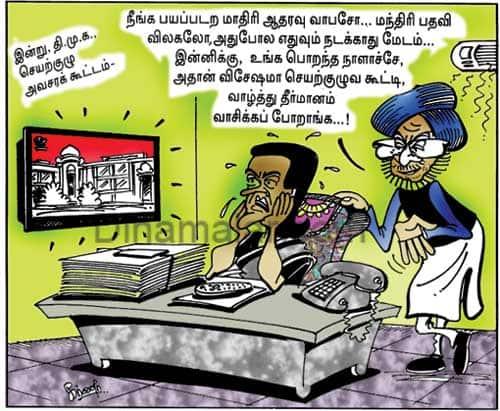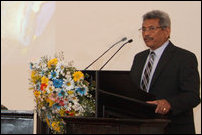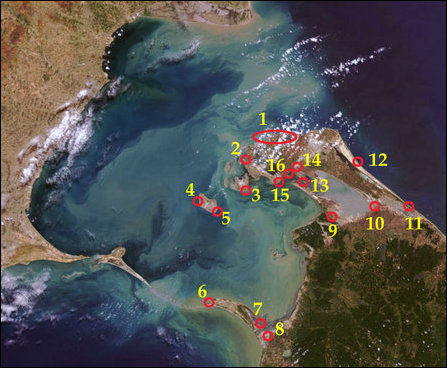[TamilNet, Wednesday, 07 December 2011, 00:07 GMT]
From allowing blatant burglary and fleecing businesses to harassing people and making money from fabricated petty offences, the Sinhala military, police and officials of occupying Sri Lanka aim to frustrate Tamils to make them leave their country, said a feature by S.M. Thiyagarajah appeared in Tamil media on Saturday. There are deeper political reasons in depriving Tamils of their self-respect and imbibing a feeling of insecurity in them, the article further said. Meanwhile, citing Prof. SK Sitrampalam speaking on Thursday, The Virakesari’s weekly editor V. Thevaraj wrote that Colombo-centric elements in the TNA and collaborative sections in the diaspora disappoint Tamils in the island. Tamils should be united against once again falling into traps by succumbing to collaboration and dearth of leadership, he further said.
Meanwhile, commenting on the feelings of the people in the North and East, a political observer in Trincomalee said, “Volumes have been written on the dangers and international injustice in leaving Eezham Tamils in the hands of the Sri Lankan state and its ethnically Sinhala military, the genocidal orientation of which is known to everybody except to the powers abetting Colombo in war and post-war.”
“Eezham Tamils increasingly realize today that war and post-war come from the same forces with the same aims, and whatever that take place, from colonisation and militarisation to grease devils and white vans, originate from the same puppet masters aiming for a ‘lasting solution’.
“Neither the paradigms of human rights joke, development-reconciliation deception and war crimes accountability left to leisure, nor behind-the-screen assurances that ‘we will look after everything, now agree to our nondescript agenda’, are going to be trusted by Eezham Tamils except by a few who dream of achieving sub-agency without doing any people’s politics,” the political observer said.
“For over 60 years the Sinhala state was deceiving Tamils. But, now the powers abetting Colombo have started openly deceiving Tamils. The unfolding reality is that both the USA and India have lost the credibility in engaging the minds of Eezham Tamils unless they openly acknowledge the need to recognize the sovereignty of Eezham Tamils suffering from genocide,” he further commented.
* * *
S.M Thiyagaraja’s feature on Saturday has brought out glimpses of the secondary stage of Sri Lanka’s colonialism in the Tamil country: from the primary stage of military occupation and terrorisation to the secondary stage of making day-to-day life a misery and bereft of self-respect.
Last week, 40 odd Sinhala officials of the Electricity Board who have come from Colombo joined the Sinhala police in Jaffna in a striking check up of electricity metres and have arrested over 140 people, including the elderly at home. Many of them were women over 70-years-old. Some of the houses were particularly targeted to humiliate people voicing for Tamil cause and rights.
None of the officials were speaking Tamil. They entered into houses and estimated the electricity consumption by seeing the appliances. Some houses were just storing the appliances of other people who have gone abroad.
Some of them were arrested saying their electricity metres were not running properly. Most of the houses in Jaffna have old metres. New ones were not supplied even to people applied for them.
The arrested were taken to police stations and were kept for a day. When produced in the court in the evening, they preferred to ‘accept’ the offences and paid heavy penalties, in order to escape remand prison and long litigations.
SL police enters into houses, arrest people and levy penalties under dengue prevention pretext, if they could cite seeing water in a coconut shell.
Sinhala price-control officials who come with the SL police routinely threaten small businesses.
Recently a business company from the South openly advertised that driving licence is not needed for its 49cc mopeds, and marketed more than 2000 vehicles in a short time. Now the SL police have confiscated them demanding licence and insurance.
SL police fleecing money from moped/ motorbike riders and SL military and police entering into houses on some pretext are common sights to see nowadays.
On Thursday and Friday, 13 shops, groceries and business enterprises around the heavily military occupied University of Jaffna locality were burgled.
The feature says that the whole orchestration is aimed at fleecing money from Tamils similar to large amount of gold and money were taken from Vanni after the war and it is aimed at chasing Tamils from their country in the island by making life miserable.
The feature accused the Tamil parliamentarians for their naivety, SL minister Douglas Devananda for his anti-people tirades, the local media for not realising the dangers in the total picture of what takes place, and the international community for allowing the situation.
The political observer in Jaffna commented that the so-called international community would rather appreciate an oppressive system developing to protect the corporate interests in the ‘conquered’ territory than caring for who rules over whom or to what extent it is genocidal.
Many of the former critics of the LTTE in the Tamil country have now started openly telling that they miss it.
A serious handicap Eezham Tamils face today in the island is that they do not know what is happening in another part of their country. What is happening in Vanni, or Batticaloa, or even in the island of Delft is not known in Jaffna and vice versa.
Like the Vanni war without witnesses, the occupying military with the assent of powers is silently conducting a war of structural genocide.
It will be a folly if any serious politicians among Eezham Tamils continue to think of the ‘virtues’ of ‘internal self-determination’ anymore. That was the model the late Mr. Balasingham agreed to try from the point of LTTE’s military strength, despite knowing that the IC’s deception begins from there. But the IC could not materialise even that. The current realities demand an externally guaranteed solution based on full self-determination of Eezham Tamils. They do not want to see any more confusions from their political leadership in voicing what their hearts want, the political observer in Jaffna said.
* * *
Speaking to Virakesari on Thursday, Professor S.K. Sitrampalam was blaming Colombo-centric thinking in Tamil politics for many of the failures of Tamils in the past and for the current confusions.
It was Vanniyasingham (Koappaay MP in the 50s and 60s) who firmly contributed to the cause even in the time of SJV Chelvanayakam. The Banda-Chelva pact [1956] and Dudly-Chelva pact [1965] were actually drafted by Vanniyasingham.
Only after his death, the Colombo-centric elements started influencing the Tamil polity. Since 1980s, Professor Wilson and Dr. Neelan Thiruchelvam played a leading role in this. The Colombo Tamil leadership was responsible for making Amirthalingam to compromise with independence polity and to accept District Councils in 1981, said Prof Sitrampalam, a veteran member of the mainstream political party ITAK and its current vice president.
The Colombo Tamil polity was responsible for placing the entire Tamil nation into a trap from which the Tamils are unable to come out yet. Whether we are once again in such a predicament is the fear of the grassroot, Sitrampalam said.
Adding on the issue, Mr. Thevaraj said that in this regard, the diaspora too disappoints Tamils in the island.
After the Mu’l’livaaykkaal war, the Tamil nation in the entire island looked upon the diaspora as the lighthouse [of bearing, hope and guidance]. But now Tamils in the island are disillusioned.
During the war, the majoritarian chauvinism in Sri Lanka was panicked to see the struggle waged by the diaspora. But the current developments indicate that a section of the diaspora is bought over to compromise. If the trend continues, this section of Tamils is going to contribute another victory to majoritarian chauvinism in the island, Thevaraj said.
The LTTE might have had its strengths and weaknesses. But those who back collaborative or compromising polity should answer whether their polity could ever find solution to Tamils other than making majoritarian chauvinism happy.
Diaspora should understand that even if the LTTE is not there, people in the North and East are united in their commitment to the cause and they have demonstrated that in the elections by voting for the TNA, Thevaraj said while sharing the concerns of Prof Sitrampalam about deviation of TNA leadership leading Tamils into a trap.
Stand united for the cause and tell it loudly to Sri Lanka and to the world, he concluded.
* * *
Welcoming the Virakesari opinion coming from the island, a diaspora political analyst said that it should be an eye-opener to those who say that the diaspora is overplaying the aspirations of Eezham Tamils in the island. On the contrary, the diaspora is not doing enough in justifying the political aspirations, needs and realities of its kith and kin in the island.
The following are observations of the political analyst in the diaspora:
Why the diaspora is not showing the political mobilisation it was able to muster during the war is a pertinent question.
The main problem is that the diaspora is not focussing on translating the favourable changes in the world public opinion to its political advantage of targeting real impediments and tapping the right resources.
Rains may pour, but people get drinking water depending only on the mouth-size of the vessels they carry. People who take bottles virtually get nothing. It is the leadership that decides the tapping capacity of a nation. But leadership comes only from the quality of the society.
The problem Prof SK Sitrampalam pointed out as existing in the island has its diaspora versions too, operating for a long time even within the LTTE.
The Norwegian report and Mr Erik Solheim’s speech at its release show how a shade of polity similar to that of the Colombo Tamil polity pointed out by Prof. Sitrampalam was cultivated and promoted in the diaspora and within the LTTE too, by the West to trap the cause of Eezham Tamils.
The successful continuity of the deception, through various foundations, professional PR facilitations and individual cultivation of elite within the diaspora, is largely responsible for blunting the struggling spirit of the diaspora mentioned by Mr. Thevarajah.
While the esoteric ruling forces in the Establishments of the powers in the West never view the cause of Eezham Tamils either in a civil way or as a matter of importance to human civilisation, and while they treat it as an issue of military importance to their geopolitics and ‘counterinsurgency’, a campaign was made among the diaspora Tamil elite that they should lead the diaspora to speak a ‘soft’ language to find ‘acceptance’.
The ‘carrot’ shown by the US Asst. Secretary of State Robert Blake was his talk about the US expectation to see ‘acceptable’ leadership emerging from Tamils to ‘devolve’ power to the north and east. There was also the ‘stick’ of branding opinion not falling in line as of extremism and ‘terrorism’.
So we find a genre of mushrooming diaspora leadership that is either busy in hijacking the cause or simply sitting on any uprising of people.
The same question Thevarajah asks in the island that ‘what have you achieved through collaboration or what is that you think of achieving’, has to be asked in the diaspora too.
If the current forces we encounter have confirmed insensitivity to the modes of approaches then the best option is the Gandhian option of non-cooperation, the diaspora political analyst said. He cited the growing appreciation for the political stand of Gajendrakumar Ponnampalam in the island.
The analyst recollected a Sinhala folk story he heard from a friend: All the nations in the world sent their representatives to the God to request fulfilment of their wishes. One by one, they went in front of the God and spelt out their wishes and the God granted them. When the turn of the person from our island came, the God asked him what’s the matter and in the typical way of the islanders, not telling anything directly, the person said in an apologising way, “No, no, nothing, I just came.” Then the God said: “If you have just come then you just go.”
Firmly spelling out what we want, and what we are righteously entitled of, to the Sinhala nation and to the world, without worrying about anything, is the utmost need of the time as well as our duty to the posterity, the analyst said.

 முதல்வர் அம்மா அவர்களின் இந்த உதவியால் இலங்கைத் தமிழர்கள் தங்கள் படிப்பினை இடையில் நிற்காமல் தொடர்ந்து படித்து அவர்கள் வருங்கால வாழ்கையில் வளம் காணமுடியும். அம்மாவுக்கு இதயம் கனிந்த நன்றி. வாழ்க வளமுடன். வாய்ப்புக்கு நன்றி.
முதல்வர் அம்மா அவர்களின் இந்த உதவியால் இலங்கைத் தமிழர்கள் தங்கள் படிப்பினை இடையில் நிற்காமல் தொடர்ந்து படித்து அவர்கள் வருங்கால வாழ்கையில் வளம் காணமுடியும். அம்மாவுக்கு இதயம் கனிந்த நன்றி. வாழ்க வளமுடன். வாய்ப்புக்கு நன்றி. 






































